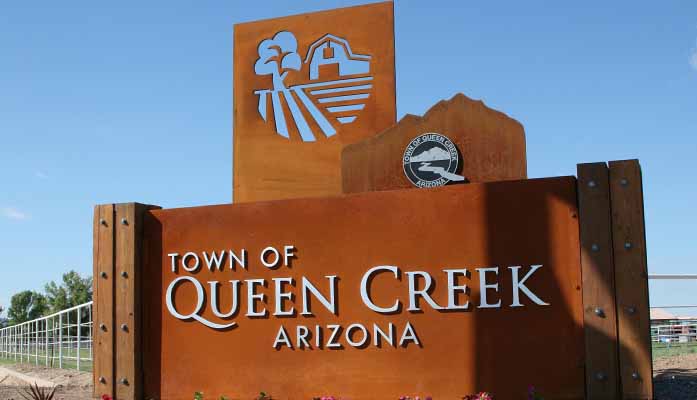
by Terri Jo Neff | Oct 11, 2021 | News
By Terri Jo Neff |
Dozens of organizations, government agencies, and private businesses across Arizona will benefit from more than $9.4 million in competitive grant funds awarded last week by the Arizona Office of Tourism.
The Oct. 5 announcement of the Visit Arizona Initiative Partnership grants is part of an effort to increase visitation and tourism spending in Arizona, bolster job creation, and accelerate economic recovery.
“With tourism being the hardest hit industry and still working to recover, we were really focused during this initial round on getting funds to communities that needed it most,” said Debbie Johnson, Director of the Arizona Office of Tourism. “We worked diligently through this process to provide support statewide and I’m proud to say we achieved that goal.”
The Office of Tourism reports that almost 200,000 Arizonans were employed in the tourism industry prior to COVID-19. Tourism also contributed over $3.5 billion in tax revenue to federal, state, and local economies before the pandemic.
But Arizona’s 2020 overnight visitation decreased by 31 percent and visitor spending decreased by 41 percent compared to 2019 numbers, according to Gov. Doug Ducey’s office when he announced $101.1 million in federal American Rescue Plan funds would be used to launch Visit Arizona Initiative in July.
“These grant awardees, which were selected through the Arizona Office of Tourism’s competitive process, will attract more tourism to Arizona and lead to more jobs and spending in communities throughout our state,” Ducey said last week when the funding was announced.
Those receiving grants are:
Phoenix Central Region ($3,713,558)
Arizona Basketball Coaches Association
Arizona Jewish Historical Society
Ballet Arizona
Desert Botanical Gardens/Taliesin West
Easy Dave’s
Greater Phoenix Convention & Visitors Bureau
Heritage Square Foundation
International Jazz Day AZ Foundation
Musical Instrument Museum
Naismith Memorial Basketball Hall of Fame
Phoenix Art Museum
Phoenix Zoo
Scottsdale Fashion Square
Superior Chamber of Commerce
The Phoenix Theater Company
Town of Fountain Hills
Visit Mesa
Tucson & Southern Region ($4,670,830)
Arizona Media Arts Center
City of Sierra Vista
Graham County Chamber of Commerce
North Center Productions, Inc.
Perimeter Bicycling Association of America, Inc.
Southern Arizona Arts & Cultural Alliance
Tubac Chamber of Commerce
Tucson Bicycle Classic
University of Arizona Cycling Team
Willcox Theater and Arts, Inc.
Northern Region ($452,698)
Creative Flagstaff
Flagstaff Dark Skies Coalition
Flagstaff Symphony Orchestra
Grand Canyon Music Festival
Lowell Observatory
Museum of Northern Arizona
Peak Events, LLC
North Central Region ($364,609)
Mountain Bike America, LLC
Prescott Chamber of Commerce
Sedona Arts Center
Sedona Mountain Bike Festival, LLC
West Coast Region ($235,226)
City of Kingman
Go Lake Havasu
Parker Regional Chamber of Commerce and Tourism
Yuma History Museum
In addition, the Phoenix-based event company Cloth & Flame was awarded funding under all the regions.

by AZ Free News | Oct 11, 2021 | News
By AZ Free News |
Governor Doug Ducey today announced the appointment of Angela K. Paton to fill a vacancy on the Arizona Court of Appeals, Division I. The vacancy on the Court of Appeals was created by the retirement of Judge Lawrence F. Winthrop, who was named to the Court in 2002.
“Angela’s extensive experience in the public sector, commitment to her community, and profound respect for the separation of powers prepare her to serve the people of Arizona,” said Governor Ducey. “I am pleased to appoint her to the Arizona Court of Appeals.”
Paton has spent the majority of her career at the Arizona Attorney General’s Office. Currently, she is a Special Assistant Attorney General, in which she is responsible for providing legal counsel and policy advice to the Attorney General’s Office’s six divisions.
Prior to her current position, she served as Assistant Solicitor General from 2017 to 2019. In this role, she was the Ethics Counsel, advising about ethics issues in her office, and the Opinions Counsel, drafting legal opinions on questions of statewide importance requested by public officials. She began her career as an Assistant Attorney General in the Criminal Appeals Section from 2010 to 2013. In 2011, she received the Attorney General’s Office’s Emerging Star Award.
Before rejoining the Attorney General’s Office, Paton worked as a policy advisor to Commissioner Bob Burns at the Arizona Corporation Commission from 2013 to 2017. There she handled complex utility regulation and constitutional law matters.
Paton is returning to the Court that she clerked for after law school. After graduating from law school, she clerked for Arizona Court of Appeals Judge Patrick Irvine.

by Terri Jo Neff | Oct 10, 2021 | News
By Terri Jo Neff |
Silly Season is that time when professional sports teams announce major trades, resignations, and firings. It starts in Major League Baseball later this month when the World Series is finished, and will be on full display within NASCAR once the season-ending checkered flag waves at Phoenix Raceway on Nov. 7.
This fall, the 55th Arizona Legislature is having its own version of Silly Season, with myriad vacancies that will change the dynamics of the House and Senate when the second regular session starts in January 2022.
One of those vacancies is slated to be filled any day now by the Maricopa County Board of Supervisors following last month’s resignation of Rep. Aaron Lieberman (D-LD28) who is running for Governor. Lieberman’s replacement will be selected by the county board once it receives a list of three nominations from the precinct committeemen of the Democratic Party of Maricopa County.
Sen. Kristen Engel (D-LD10) has also resigned to focus on her campaign for Congressional District 2. The Pima County Board of Supervisors has already received three nominations from the Pima County Democratic Party precinct committeemen for Engel’s replacement, one of whom is Rep. Stephanie Stahl Hamilton (D-LD10).
Stahl Hamilton is seen as the favorite when the county board votes Oct. 19, meaning the Pima County Dems would then have to repeat the precinct committeemen nomination process to fill Stahl Hamilton’s seat in the House.
However, not all of the vacancies will be connected to campaign efforts.
Rep. Randy Friese (D-LD9) announced in March he was running for CD2, which would have pitted him against Engel and Rep. Daniel Hernandez in the Democratic Party primary. Friese, who is a physician, dropped out of the race in September, citing personal and professional considerations. He recently confirmed his intention to leave the Legislature in the next few weeks.
Once Friese’s resignation is formally tendered then the Pima County Democratic Party precinct committeemen will meet once again to nominate three replacements for the Pima County Board of Supervisors to choose from.
In early September, Rep. Bret Roberts (R-LD11) announced his resignation effective at the end of the month due to a planned family move out of state. His district covered portions of Pima and Pinal counites, but it will be the Pinal County Republican precinct committeemen who will nominate three replacements for the Pinal County Board of Supervisors to choose from.
Of course, the most shocking resignation occurred in August when Sen. Tony Navarrete (D-LD30) was arrested for multiple felonies related to child molestation. The vacancy of Navarrete’s seat was filled by Rep. Raquel Teran (D-LD30), whose replacement in the House has not yet been announced by the Pima County board.
But it does not take a lawmaker’s resignation to mix things up at the Legislature.
Sen. Michelle Ugenti-Rita (R-LD23) announced earlier this month she is stepping down from one of the most influential legislative assignments – chairperson of the Senate Government Committee. She told Senate President Karen Fann that she will continue serving on the Appropriations, Commerce, and Finance committees, and stands “ready and committed” to election reform, one of the key subjects handed by the Government Committee.
The unexpected announcement by Ugenti-Rita, who is running for Arizona Secretary of State, has already led to backdoor discussions and public posturing by some senators hoping to sway Fann’s decision on who replaces Ugenti-Rita on the Government Committee as well as who Fann names as the committee’s new chair.
Meanwhile, last month’s death of Rep. Frank Pratt (R-LD8) will trigger another round of recommendations by Pinal County’s Republican precinct committeemen to the Pinal County board to fill Pratt’s seat.

by Corinne Murdock | Oct 9, 2021 | News
By Corinne Murdock |
More illegal immigrants from Uzbekistan were discovered crossing the Yuma, Arizona border.
Townhall reporter Julio Rosas discovered this less-common variant of illegal immigrant while visiting the Yuma border on Thursday.
“This family that just crossed the Colorado River told me they’re from Uzbekistan, that’s a first one for me,” wrote Rosas. “Three adult males who illegally crossed into the US here in Yuma showed me their Uzbekistan passports. They turned themselves in to the BP [border patrol] agent who was by the gap in the border wall.”
A small portion of Uzbekistan is bordered by Afghanistan in the south, while a majority of the country is bordered by Kyrgyzstan, Tajikistan, Kazakhstan, and Turkmenistan. A majority of the population are Uzbek, nearly all of whom are Sunni Muslim. The Taliban are also considered Sunni Muslim.
Reportedly, the Uzbek government has kept up strict border policies with Afghanistan historically. The Taliban’s advances leading to the takeover in August caused Uzbekistan and neighboring countries to increase their border security greatly.
It is unclear why there would be an influx of Uzbek illegal immigrants. Uzbekistan is one of the more prosperous and safe countries in Central Asia. From November to early spring of this year, protests broke out across the country as it faced power supply shortages aggravated by intense winter storms. However, these protests didn’t reach the severity of the 2005 Andijan Massacre, in which hundreds were shot to death during a protest to release 23 businessmen imprisoned over accusations of Islamic extremism.
Uzbek illegal immigrants aren’t an entirely new development for the border crisis. Customs and Border Protection (CBP) reported in January an uptick in Uzbek illegal immigrants. CBP officials explained that those caught earlier this year were escaping persecution for homosexuality. Uzbeks that engage in homosexual relations can face up to three years in prison.
Under the Taliban, punishment for homosexuality includes being stoned to death, crushed under a wall, or thrown off a tall building.
Arizona’s Refugee Resettlement Program doesn’t have any data on Uzbek resettlement since 2015.
Corinne Murdock is a reporter for AZ Free News. Follow her latest on Twitter, or email tips to corinne@azfreenews.com.

by Corinne Murdock | Oct 9, 2021 | Education, News
By Corinne Murdock |
In March, the Arizona Department of Education’s (ADE) Social Studies newsletter advertised grant funds for teachers who would implement the 1619 Project. The Pulitzer Center offered a $5,000 grant to 40 educators; applications were due in March. The 1619 Project is an exercise of critical race theory, which holds that race is a socially-constructed idea created by white people to exploit and suppress anyone who isn’t white, and that all social, political, and economic institutions in this country were created by and operate on racism.
The Pulitzer Prize-winning newspaper series was debunked by historians roundly and subsequently edited significantly without any editor’s notes from its publisher, The New York Times. The initial goal of the project was to “reframe the country’s history” by establishing the year 1619 as the United States’s “true founding,” while focusing “the consequences of slavery and contributions of black Americans” as the lens through which to view past and present American society.
Parent and co-founder of West Valley Parents Uniting, Heather Rooks, resurfaced ADE’s newsletter promoting 1619 Project grant funds.
“Social Studies Newsletter back from January 2021, Arizona Department of Education to the Peoria Unified School District,” wrote Rooks. “Pulitzer Center offering grants to teachers to help implement the 1619 project ? So @azedschools is clearly using incentives to push CRT is AZ schools!”
In February, ADE’s Office of Equity, Diversity, and Inclusion also suggested that the 1619 Project podcast was an appropriate educator resource for Black History Month.
In a statement to AZ Free News, Rooks questioned how ADE could be trusted with educating Arizona’s students if they promoted such unacademic materials. She urged parents to up their vigilance.
The Arizona Department of Education sends out newsletters to school districts across the valley. You would think the Department would have resources to help students with loss of learning. But instead, there’s a newsletter from January 2021 showing a promotion from Pulitzer Center giving out grant money to teachers who implement the 1619 project in their classrooms. I am a parent who wants the best education not only for my children, but for all children in Peoria Unified School District. Finding this newsletter through public records in emails of the curriculum team with the Peoria Unified School District was incredibly sad and shocking to say the least. If we can’t trust The Arizona Department of Education, how do we trust the Districts? Parents need to be aware of these newsletters coming to school districts from the Arizona Department of Education. Offering incentives to push Critical Race Theory into schools is completely wrong. West Valley Parents Uniting stands for transparency for parents and academics for students. Apparently the Arizona Department of Education doesn’t stand for Truth.
Corinne Murdock is a reporter for AZ Free News. Follow her latest on Twitter, or email tips to corinne@azfreenews.com.

by Terri Jo Neff | Oct 9, 2021 | News
By Terri Jo Neff |
The Arizona Court of Appeals has affirmed the dismissal of a lawsuit filed in 2019 against the Sun Valley Farmers Property Owners Association of Queen Creek involving a developer’s plans to build multi-family housing on land the company owns.
In its Oct. 5 unanimous decision, the appellate court sided with a Pinal County judge who ruled earlier this year that AZ Developers LLC would have violated the Association’s lawfully enacted Conditions, Covenants and Restrictions (CCRs) by trying to construct an apartment complex on a parcel of land it purchased in June 2018.
According to court records, AZ Developers hired an architectural firm to design preliminary site and building plans for what would have become Ocotillo Crossings Apartments. But nothing more could happen until the parcel’s SR (Suburban Ranch) and CB-2 (General Business) zoning was changed and its land-use designation changed.
The Association president learned of the company’s plans during a community meeting, and later inquired with AZ Developers about how it was going to address the CCRs which state there “shall be no more than one single family residence…per parcel.”
AZ Developers soon initiated legal action against the Association, asking a Pinal County judge to rule that the language of the CCRs did not actually prohibit multi-family units and to order that the Association be barred from trying to derail the company’s plans.
Among the arguments put forth by the developer was that revisions made to Sun Valley Farms’ CCRs in 1996 were not properly made. The company also argued the CCRs were vaguely worded and thus could not be relied on to prohibit building multi-family units within the Association’s boundaries.
The Association responded by filing a motion for summary judgment, which allows a judge to dismiss a lawsuit early in the process if there is “no genuine dispute as to any material fact” and the requesting party is entitled to judgment as a matter of law.
Judge Stephen McCarville granted the motion for summary judgment, ruling that the 1996 version of the CCRs was duly adopted and recorded, and thus was enforceable. Which meant, McCarville ruled, that the “only interpretation” which could be made is that multi-family housing is prohibited on the land AZ Developers purchased.
McCarville also ordered AZ Developers to pay the Association’s attorney’s fees and costs from defending the lawsuit. The company then appealed, arguing that the CCRs did not specifically prohibit multi-family housing.
On Oct. 5, the court of appeals released its unanimous decision authored by Judge Sean Brearcliffe.
“In interpreting restrictive covenants, as with other contractual provisions, we give ‘effect to the intention of the parties as determined from the language, as well as the circumstances and purposes relating to its creation,’” Brearcliffe wrote, adding that the trial court properly determined “the plain intent and purpose of the restrictions was to limit any housing to single-family residences.”
And according to Brearcliffe, the Association could protest multi-family structures on the land owned by AZ Developers even if the CCRs do not include the words multi-family or apartment.
“That single-family residences are the only type of residences discussed and regulated reasonably indicates that other residential forms are prohibited,” the appellate decision states. “To allow apartment complexes here would similarly run counter to the CC&Rs.”
Summary judgment was also supported by the fact the CCRs made no mention of the type of construction mandates for multi-family residences that were specified throughout the CCRs for single family dwellings and associated structures such as garages, the decision states.
“Had the Association intended to permit multi-family residences on the land, it would have discussed the minimum livable area requirements for those buildings and it likely would have similarly discussed the number of permissible units,” Brearcliff wrote. “It would not have permitted multi-family housing to be built with no restrictions while setting restrictions for single-family housing.”
AZ Developers LLC can file a petition for review to the Arizona Supreme Court within 30 days of the Court of Appeals decision.






